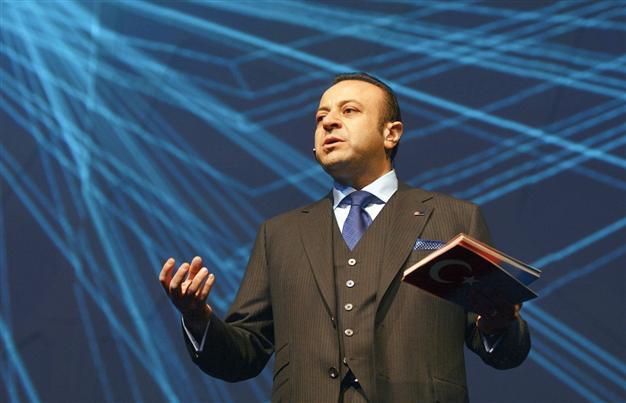Bağış urges investors to avoid Cyprus for Turkey
ANKARA

It better for investors who have money in Greek Cypriot banks to invest in Turkey, EU Minister Bağış says, warning against consequences of Cyprus’ crisis. AA photo
Investors who loan their cash to Greek Cyprus’ banks should consider investing in Turkish lenders instead, Turkey’s European Union minister has said as Ankara prepares to revive its frozen relations with the bloc.“Investors who have money in Greek Cypriot banks should think carefully; this [economic] crisis could affect them, too. It is better for them to invest in Turkish banks,” EU Minister Egemen Bağış told Anatolia news agency in a recent interview.
Bağış is scheduled to visit Dublin next week where he will conduct talks with the next term president, Ireland, on opening negotiation chapters after a two-year hiatus. Bağış said Irish officials had already expressed their optimism at opening at least one chapter during their presidency after Turkey froze its relations with the EU amid the ongoing Greek Cypriot presidency. Prime Minister Recep Tayyip Erdoğan is also expected to soon begin a heavy diplomatic schedule that will feature a number of meetings with key EU leaders.
Stating that the economic crisis that hit the country was no surprise to him, Bağış said Nicosia was taking confusing steps in the European Union. “If the Annan Plan [to reunify Cyprus] had been accepted in 2004, Greek Cyprus wouldn’t be in an economic crisis because there would be investments, income from tourism and a positive atmosphere.”
Commenting on the south’s economic hardships, Turkish Cypriot Prime Minister İrsen Küçük said they could direct a Greek Cypriot aid call, if there is any, to Turkey, assuming the intermediary role between two countries.
Bağış recently said Turkey would consider helping Greek Cyprus if they applied fro help from Turkish Cyprus, although Küçük said they had not received any application for economic aid while stressing that Turkey was still growing despite the economic crisis.
“Turkey has recently helped countries in an economic crisis like Libya and Sudan. However, Turkey’s non-recognition of Greek Cyprus is an obstacle for establishing bilateral relations, as well as for economic aid,” Küçük said.
The prime minister admitted that the EU had not been able to solve the country’s problems despite its support. “The economic crisis began before Greek Cyprus’ EU presidency, but it deepened more during this period. Despite the facilities and credits provided by the EU, it shows that the situation is quite serious in the south,” said Küçük.
Deputy Prime Minister Beşir Atalay, meanwhile, told reporters in the Central Anatolian province of Kırıkkale that almost-suspended negotiations between Turkey and the European Union were expected to be reactivated in 2013.
“We are going to launch a very speedy process with the Irish term presidency,” Atalay said, adding that Erdoğan would pay visits to European countries early next year.
Erdoğan’s itinerary includes a visit to Austria in February but he will also host German Chancellor Angela Merkel and French President François Hollande. Erdoğan is also expected to meet the ambassadors of EU countries in January, when he will deliver important messages to the EU.
“We are going to have serious and speedy traffic with the EU in this process, and we will reactivate our EU process,” Atalay said.
















